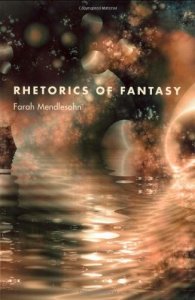 I don’t usually log books I’ve only read part of, but I need someplace to stash my notes on the bits of Farah Mendlesohn’s Rhetorics of Fantasy that are relevant to the Jonathan Strange & Mr Norrell reread, and I’ve come to accept that I’m probably never going to read the book straight through.
I don’t usually log books I’ve only read part of, but I need someplace to stash my notes on the bits of Farah Mendlesohn’s Rhetorics of Fantasy that are relevant to the Jonathan Strange & Mr Norrell reread, and I’ve come to accept that I’m probably never going to read the book straight through.
Rhetorics of Fantasy is a critical work examining “the way in which a text becomes fantasy or, alternatively, the way the fantastic enters the text and the reader’s relationship to this.” It argues that fantasy can be divided into four categories: the portal-quest (a character, and through them the reader, enters a fantastical world); the intrusion fantasy (fantasy enters the fictional world); the liminal fantasy (“magic hovers in the corner of our eye”); and the immersive fantasy (the fantastic is treated as the norm throughout).
These are thought-provoking categories, and I’d like to read the book in its entirety. But I find Mendlesohn’s prose a lot of work—this is not a complaint, I’m sure it’s within the norms of its genre, it’s just not a genre I’m used to reading. Also, I haven’t read a number of the works being closely examined, making those sections even harder going: so, realistically, I’m never going to finish this.
But what Mendlesohn has to say about JS&MN is quite useful and interesting. She categorizes it as an intrusion fantasy, though she points out that it’s more complicated than this: it opens as an immersive fantasy, because everyone agrees that magic exists . . . it’s just not performed any more, and thus its return is an intrusion. And (like in Lud-in-the-Mist) “magic is not an intrusion, but part of a palimpsest,” visible depending on one’s perspective.
The intrusiveness of magic in JS&MN is linked to manners—from politeness up to the very broadest sense of what different groups’ proper social roles are. Related to this is the way the story builds conflict around knowledge (how it’s arrived at, who has access to it) and how it talks about magic in terms of motion and the senses. And the footnotes, too, are intrusive, in that they often “disrupt the meaning or common understanding of the tale told in the main text.”
(There’s also a discussion of Stephen which I shall elide here for spoiler purposes, but which follows pretty obviously, I think, from what I’ve summarized above.)
Like I said, useful stuff, and I particularly like the bit about the footnotes. I’m sure I’ll be coming back to these ideas.
Would you want to elaborate on Stephen in the comments? I can guess that magic associated with a black man is also rather intrusive, but I wasn’t clear on his role in the story as a whole.
Sure.
SPOILERS FOR JONATHAN STRANGE & MR NORRELL
Mendlesohn talks about Stephen as reminding the reader that “the palimpsest of the world is constructed through perspective. If the magicians see a different world than do the rest of us, so do servants from their masters, and the black man from the white men around him.” Stephen’s experience of magic via the gentleman with the thistle-down hair, as well as his extremely uncomfortable place in human society, makes him “both intruder and intruded upon,” in the physical places and in the personal/social relationships. Then when he becomes king, “There is no greater intrusion than the new broom sweeping clean.” This turns the world upside-down: “the words said of Africans are now applied to Fairy: Stephen the “African Prince” becomes the ruler of a “dark land,” providing Englishness to the indigenes,” and at the end of the book, women take up magic.
END SPOILERS
I hope that’s useful. If not, I’ll do a better job when I reread the relevant passages!